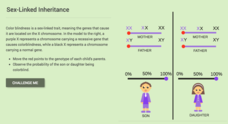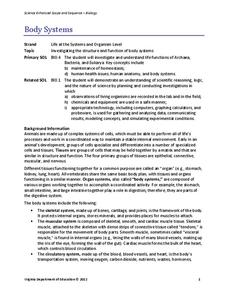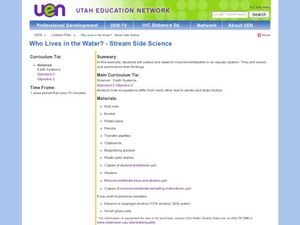CK-12 Foundation
Sex-Linked Inheritance
Sex-linked traits indicate a gene's location on a specific chromosome. Scholars learn about sex-linked traits and the specifics behind color blindness in the videos. Then they complete the online interactive to apply their knowledge...
National Park Service
Living & Non-Living Interactions
What better way to learn about ecosystems than by getting outside and observing them first hand? Accompanying a field trip to a local park or outdoor space, this series of collaborative activities engages children in...
Virginia Department of Education
Modeling the Big Bang Theory
Young astronomers learn about the Big Bang Theory and redshift through a hands-on activity in the last installment of a three-part series. Participants draw dots on balloons and then inflate them to model how galaxies moved farther apart...
CK-12 Foundation
Satellites, Shuttles, and Space Stations: Satellites in Orbit
Blast off! How do satellites, space shuttles, and space stations escape Earth's gravity and achieve orbit? Young astronauts study rocket science (literally) with an interactive lesson. They discover the four main uses for satellites, how...
Scholastic
Study Jams! The Rock Cycle
Rock out with a song, video, and quiz about the rock cycle. Learn how it is similar to recycling, the different kinds of rocks, and how they form. There is a karaoke feature that allows learners to sing along, helping to cement the...
Virginia Department of Education
Body Systems
The human body is an amazing thing! Explore the body with your high school class as they investigate each system in detail. They learn components of each organ system and disease processes that can negatively affect general health and...
Virginia Department of Education
Changes in Ecosystems
How does water pollution affect the environment? Provide your class with the resources to answer this question as they learn about eutrophication and ecosystem changes. Over two weeks, they simulate the effects of pollution on the...
Virginia Department of Education
Historical Models of Atoms
What does the past have to do with today? Young scientists find that answer as they learn more about past chemists and their significant contributions to the field. Pupils use the Internet to research historical figures...
Scholastic
Study Jams! Earth's Atmosphere
Earth's thick atmosphere plays a vital role in the ability of the planet to sustain life. Learn about the layers of the atmosphere and their properties, how the gases surrounding the earth help protect the planet, and a little about...
Resources for Educators
Math & Science Connection
Whether you're using a collection of Dr. Seuss books to teach basic math skills like counting, adding, and subtracting, or exploring the different states of matter by melting a crayon with a hairdryer, a series...
Curated OER
An Interdisciplinary Approach to Learning with Walt Whitman
Use poetry as a mode for creating interest and cross discipline learning.
Curated OER
Student Opinion: Are You Popular, Quirky or Conformist?
Approach the topic of popularity with this resource from the New York Times and their Learning Network series. The article is about Alexandra Robbins' "Quirk Theory." Learners respond to the article excerpt either on paper or...
Student Handouts
Four Things I Learned About...
Thinking about what they have just learned with a short reflection worksheet. Kids note four things they have learned in small frames after writing the topic at the top of the page.
Curated OER
Learning the Months of the Year
Use this resource as a way to teach children the months of the year. When you click on a month, it disappears, the children need to then say the months in order even with one missing. When you click home, it replaces the months so you...
Curated OER
Sounds Like Great Science!
A phenomenal lesson on sound is here for your third graders! In it, learners engage in hands-on activities, watch video, take part in Internet activities, and complete tasks in cooperative groups in order to explore the world of sound...
Curated OER
Debating Controversial Issues: Integrating Science and Current Events
In order to give young scientists experience with critical thinking skills, introduce them to a current controversy and prepare them to debate. Choose a topic, such as genetically modified organisms, and assign groups to represent...
Curated OER
"Croak" Science Mystery
Solve the mystery of a declining frog population! Lead your junior ecologists on an investigation that simulates actual events concerning pollution, predation, poaching, and more. Investigators read a story online, then analyze survey...
Curated OER
Science-Observation Skill Builders
Pupils explore observation while making connections between observation skills and careers (like how farmers observe the weather). They view a variety of nature photographs on the computer and practice their observation skills by...
Curated OER
Clouds
Incorporate art and poetry into an early elementary science lesson about cloud formation. With fun and engaging activities that follow a natural learning progression, youngsters will develop key vocabulary and conceptual understanding...
Curated OER
Learning Sequence Item: Mitosis and Meiosis
Investigate the ins and outs of cell division with this comprehensive set of activities. Detailed instructions for six different activities and your choice of eight different creative assessments can be found within this resource. By...
Curated OER
Seeing Science - Color and Spectra
Students explore various scientific concepts, such as color and spectra, and use iMovie to create movies that demonstrate and explain these concepts to their classmates. They research a concept and use AppleWorks to create a storyboard.
Curated OER
Who Lives in the Water? Stream Side Science
Andree Walker thought of everything when he wrote this resource. It includes a detailed list of materials and background information links for the teacher. In addition, it has procedures, a macroinvertebrate identification key, and tally...
Government of South Australia
Don't Waste Your Energy
Don't lift another finger, this physical and environmental science unit has everything you need to begin teaching your class about energy. Starting with a look at the greenhouse effect, these lessons and activities take young scientists...
Consortium for Ocean Science Exploration and Engagement (COSEE)
Plankton to Penguins: Antarctic Food Web
A well-written lesson plan, second in a series of four, gets high schoolers exploring how the Antarctic food web is impacted by climate change and the associated melting of polar ice sheets. It begins with a PowerPoint presentation about...
Other popular searches
- Project Based Learning Science
- Science Cooperative Learning
- Science Learning Contracts
- Science Learning Centers
- Science Learning Cycle
- Science Problem Based Learning
- Mastery Learning Science
- Inquiry Based Learning Science
- Independent Learning Science
- Learning Cycle Science Earth
- Science Learning Games
- Inductive Learning Science






















